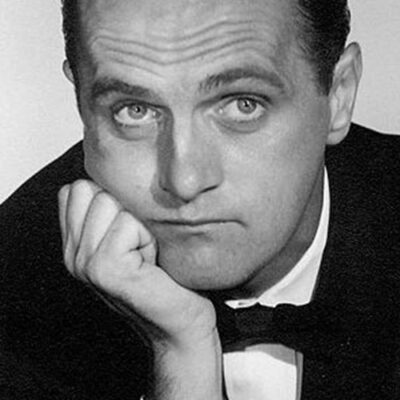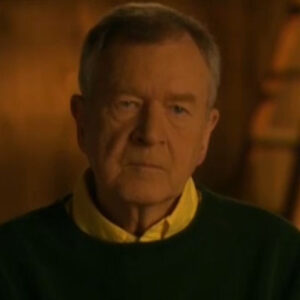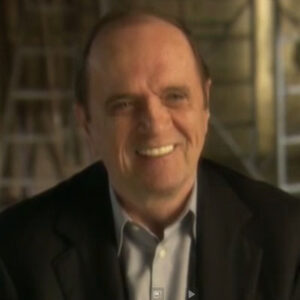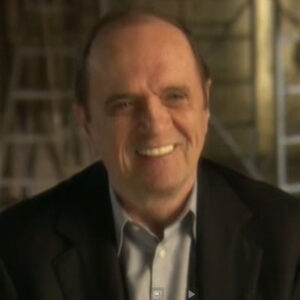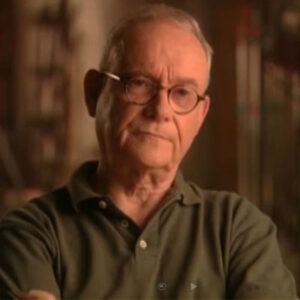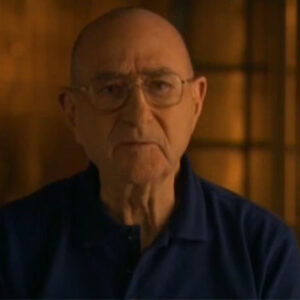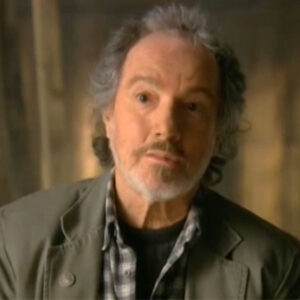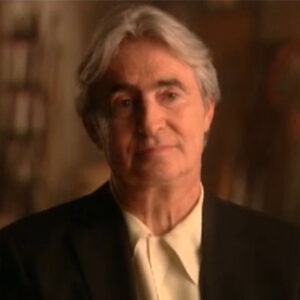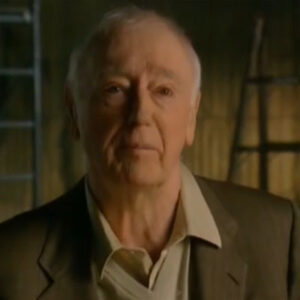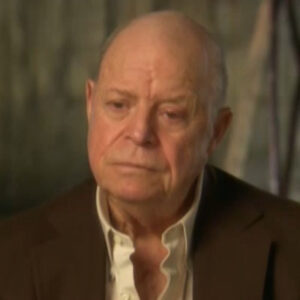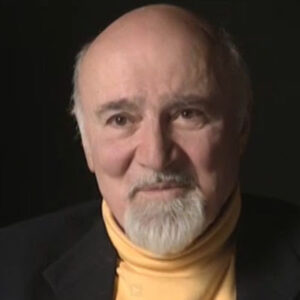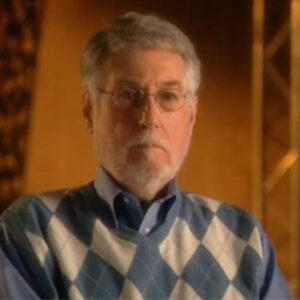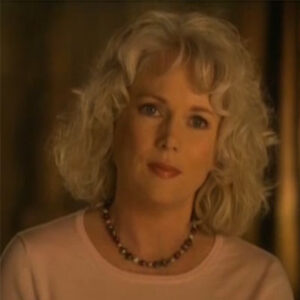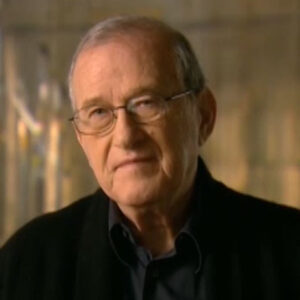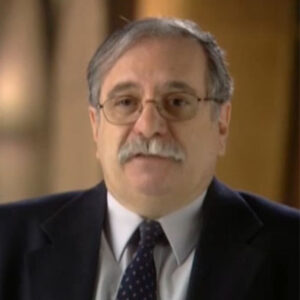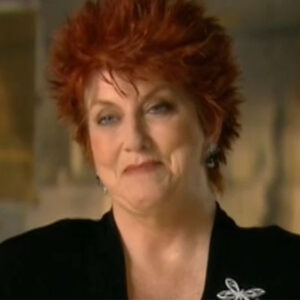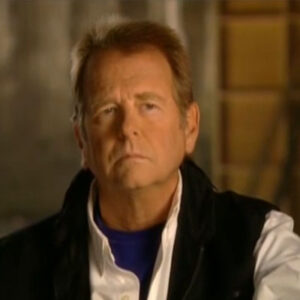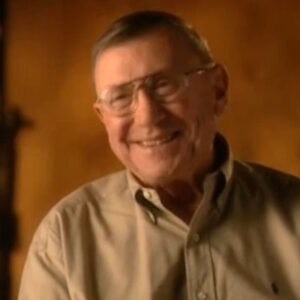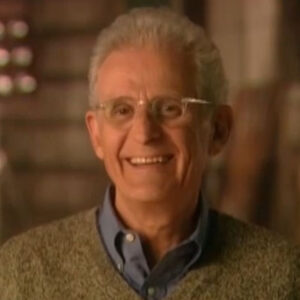Ginnie Newhart: Well, it was the way he tells it was a blind date. I was dating I knew Buddy Hackett through somebody else. And I would take care of their children. I would babysit for them. But he came home one day and you said, I met this guy. And his name is Bobby Newhart. I played golf with him. And I think you should marry him. Oh, okay. And we had a blind date at Buddy’s house, Buddy and Cherie’s house, and we with another couple and we play pool, which I I’ve never played in my life and I never played since. And just silly. It was just silly. I was 20, 21, 21, and I think Bob was 32. And every time somebody would sink a ball in the pocket or whatever you’re supposed to do when you run around the table with our cue stick singing Bridge on the River Kwai. And it was we had fun. We didn’t see each other for a while. And then I was working as an extra on a Jerry Lewis movie that I couldn’t tell you the name of it, but it was a paramount. And Bob was doing hell is for Heroes. And. He came to visit me on the set and I wasn’t there, and then they they told me, they said Bob Newhart was here yesterday and he’s. So I went over to his set. He wasn’t there. And we sort of lost touch because he was traveling a lot.
Interviewer: What was your first impression of. How would you.
Ginnie Newhart: Um, oh boy. He was cute. Oh, I hope he doesn’t see this. Oh, dear. He was. He was cute. He was fun. And then I remember he didn’t drive, so I drove him home. And we had a wonderful he was. He was very interesting to talk to and very, very bright, very well read and. I just liked him as a person. I just liked him as a person.
Interviewer: Was he sort of quiet or shy or more?
Ginnie Newhart: He’s shy. He’s very shy. I often think there are two bobs. You know, there’s that. There’s the Bob Newhart I can get up in Vegas. And I know he’s he he has butterflies, but there are no really overt signs of nervousness. He I mean, his hands are dry and his you know, he and I. And then he walks out on that stage and I watch. And I think that is not the same Bob Newhart that I just asked two weeks ago to put chicken on the barbecue and he became a massive quivering jello. You know, he was to. Please don’t make me do that, please. But I said you can get up in front of I’ve seen ten thousand people and really be in charge. I can’t say he was always like that. Not, when we first got married, but in the last twenty five years, certainly I’ve seen that change where he can handle just about every situation.
Interviewer: When we talked on the phone, I mentioned something I thought was so interesting is that when you first met him in your first day, that he was someone who listened.
Ginnie Newhart: Yes. Well. You go out in the dating world and and nobody listens. You know, I think everybody’s thinking about what am I going to say next? What is she going to say next? And he listened and I. As most young girls, I was having a few problems with my mother and he was always he was always when I knew I could call up and talk to. And he never gave me a short shrift. He listened and I thought, boy, this is this is a very special person. He’s just very special. And he was compassionate. And as I say, he cared. He cared. It wasn’t. There was no phoniness. He genuinely cared whether I was happy or unhappy.
Interviewer: You also talked about a little bit about you were the difference between you were seeing someone else that was not sort of the typical romantic type of. Can you.
Ginnie Newhart: Well, I can give you an example. It was my 21st birthday and this other person that morning, I got roses, beautiful long stem roses, and he was taking me out that night to a place that was very, very hot in those days called PJAK Forks. And he gave me a gorgeous. What do you call the gold bracelets? No, not a tennis bracelet. This is long before tennis bracelets, charm bracelets, and he called me all day. So, Bob Simpson, I’d like you to come out to the studio because he was doing the first Bob Newhart Show. Now, he didn’t drive. So I drove. And he never, ever, ever said, well, I’ll fill up the gas tank. And I needed the. Yeah. No, I wasn’t exactly. I was going to school and taking jobs I can get during the day. And we went to the place called across the street from NBC in Burbank, and it was called sailing’s, who was just a little hamburger place. And then he said, excuse me. And he ran next door. And I’m waiting out on the street and I see him come in and he’s got an envelope and he’s looking at indecent here. Here’s for your birthday. So I was on to open it, said something. I mean, wasn’t very flattering. It was one of the funny cards and said. Happy birthday, fatso or something. And I opened it up and there’s a 20 dollar bill. I said, oh, boy, this is going from the ridiculous to this anymore. For the sublime to the ridiculous. And that was his gift. And he was the money for for the gas, for the car. Here’s here’s here’s one month’s gas for the car. I thought it costs more than twenty dollars. Then the second gift is I remember we were engaged and he gave me a check. And I said I said, don’t you ever, ever, ever give me a check again, ever. And he didn’t. He didn’t. But then the first. The first gifts were. I finally said, look up, pick out. You just go in and I’ll pick a bunch of things and you decide what you’ve like. I said, no, you know, we f.
Interviewer: You figured out a system. Yeah. Yeah. Just so it’s clear, if you could.
Ginnie Newhart: Sure.
Interviewer: That you were dating someone else at that time, just another person person’s. If you could just explain. You were dating Bob.
Ginnie Newhart: Yeah, I was dating this other person before Bob. And then Betty came and said I met this wonderful young guy, comic Bobby Newhart, and I really didn’t know who he was. I’d heard the name, but I didn’t have his albums. And I didn’t really know what he did untill I. He was doing the television show and then I would go for the taping sometimes and then I ended up working on it.
Interviewer: And what was that like?
Ginnie Newhart: You know, I didn’t realize how stressed he was during that show. He never showed it to me. I mean, I knew he was stressed. He wasn’t a good eater. But he never some people, you know, show stress by temper tantrums, so he was never like that. But there was a lot going on there and he wasn’t happy. And. But I never really saw that. And. We would you know, I do the show if I did the show, and then he’d walk me out to the parking lot with neck in the park at NBC. But, um.
Interviewer: What was what do you think, do you think? Where do you think the stress came from was at that point not?
Ginnie Newhart: Did you feel like doing this? No. No, he didn’t. He I he was very insecure about what he was doing and to be thrown in so fast. I mean this was nineteen sixty one sixty two and he had just started in 60. And as you know you can imagine what is. He’s shy now but not as shy, but then he was terribly, terribly shy and to be thrown into your first record. And then that takes off. And then all of a sudden you’ve got your own television show. And he was having trouble with the writing. And Bob always has been such a. Fanatic about good writing. I mean, it’s. Well, most most performers are all performers when good writing. And if it wasn’t, he was miserable. He was just miserable. And he internalized it. He you know, he didn’t yell and scream and shout. It were just, you know, not up his stomach. And.
Interviewer: Do you think he’s sort of waiting for the other shoe to drop?
Ginnie Newhart: Sure. Oh, sure. He was. Yeah, he hit him. He’d always say they’re gonna catch on to me one day. You know, they’re they’re going to know that this is all a sham. They’re going go. Okay. Mr. Newhart, we know you don’t know what you’re doing and they’re going to come and get me, you know. And I guess I would say that. It affected me, too, because if he’s not real secure in what he’s doing. I I can’t tell you when I first started to see him take over, well, he had a thing about drunks. He did not want to play the drugs. And we were in we were engaged. We were married, I think, and. We were in Mr. Kelly’s in Chicago. And he would say the owners do not put any drunks. If you see somebody who looks like he’s a drunk. Get him out. I don’t want the drunks in the front row. So it was and he was there on an oil contract. In other words, now he was making X amount of dollars and he was there for six hundred dollars a week, which was he was losing so much money. So it was like the last night. And sure enough, there’s a drunk in the first room. And he just couldn’t play the drunks. He just couldn’t. In those days now he could. And the the owner came up after the show and Bob is furious. He’s screaming and yelling, which he didn’t do very often. But damn it. Sorry. Gosh darn it. And the owner came in. His name is Marion Thol, George Marionville, and he handed Bob a bonus check for five thousand dollars because he had done such incredible business and took the check and he ripped it up. I said, Oh. You sure showed him. I see he got you on an oil contract for no money. He has the drunk in the front row and now he’s got his five thousand dollars back. I said, you really taught him a lesson. It’s way, right? I said we could use that to finish, decorate our living room and just tore it up. Or we could have gotten a second caulker. But that’s that principle, that was principle. I said, well. I think you taught a lesson to the Marion Thole schools. Now, you know anybody like you where they will be tearing up the check and they’ll put the drunks in the front row. And it really was. I would say probably five or six years later, we were in Reno and again there were the drunks in the front row. By that time, I was getting aggravated and hearing about and I’m saying you should learn to play to drunks in the front row. And the hardest ones are the women, because you really have to walk a fine line with a woman. You can’t, you know, but the guys you can be a little stronger with. And he came off and we had a friend here and we have a friend Pierre Cosette. And Pierre happened to be there in those days, he was an agent. I believe he booked he booked a lot of the hotels in Reno. Today, he’s a producer. He does some.
Interviewer: One of the awards. The Grammys.
Ginnie Newhart: The Grammys. Anyway, so here happened to be there. And he said, so what’s going on, Newhart? And I said, Oh, I said, we’re having the same fight here. We always have. He wouldn’t play too drunk. And Peirre just he he just lashed into Bob. He said you weren’t. That’s what you do. You want to play nightclubs. You learn how to deal with drugs. And after that, there was never a problem. There was just never a problem.
Interviewer: Did he have superstitions or anything before he goes on?
Ginnie Newhart: He doesn’t before he goes on. The kids will always say. Well, I would always kind of say, okay, around five o’clock, guys, especially when they were younger. I said, you got to kind of keep it quiet and hit goes in the bedroom. And I knew that he’s. He’s thinking about the show and then he likes to get down there early. He always wants to get down there early just in case the singer in front of him, something happens, somebody heckles. That was kind of his his routine. We. But something happened. He got, what was that, the Nick at Nite Award, you know, TV land. And the girls came to the house. We’re all going together and. One said something to him and. He sort of gave her funny, not a funny answer as sort of a noncommittal answer. And then the other daughter, according to the corner, Jennifer, walked in and said Bob was in his robe. Needs it, Dad. Is that what you’re going to wear to the to the TV land? And he said, no, I haven’t gotten dressed yet. June came and said, Mom, what kind of answer is that? I said, Dad has left the room. I said, That’s Bob Newhart. You’re talking to dad. Your father is gone. And he does. He’s gone. And then he becomes that person. And that person is not thinking about anything. But what he’s going to do in the next hour.
Interviewer: So when do you tell me when you got married?
Ginnie Newhart: We were married and we got married. It’s you know, it’s not that I don’t remember because my mother and father, we got married. They were married on the 13th, we were married on the 12th of January, 1963.
Interviewer: And how did he propose?
Ginnie Newhart: Well, he proposed the way I told you. He said, if you would you go to I think it was St. Louis in winter if you had a ring on your finger. Would your parents let you go? And I said, you’re proposing. And he said, yes. So but they think, well, they let me go. But we had to go with his road manager, we Shaffir. Even though we’re engaged, we were chaperone.
Interviewer: What did you think at that time when you got married? What did you. Did you have an image in mind of what his career would be like?
Ginnie Newhart: No, I think I kind of thought that it would be, you know, nightclubs. College concerts. He did a lot of college dates in those days. I had no television. Never. Came into it. I mean, he would do the the Ed Sullivan shows. But as far as being an actor in a television show. It just never occurred to me. And yet it was such an easy transition for him. And yet he had done one. The very first television show after. After. After the Bob Newhart Show, he did a show. It was an Alfred Hitchcock. And. And it was here the lead. And my father was completely a coincidence. My father called and he said, you know, I guess got a call to do Alfred Hitchcock. And they said Bob Newhart said it. And he said, Oh, God. He said, Yeah. He said. And they had these scenes together, which was kind of which was kind of nice, but you could tell at that point, Bob was a raw talent. I think being shot in a one camera was a little tough for him. His his element was once he got into three cameras and it was like working in a nightclub. The camera’s there, not on top of you. You’re it was doing a play. And I think that’s where he really came into his element.
Interviewer: I want to talk more about that, too. But can you tell me how you had your kids? Fairly.
Ginnie Newhart: We were Catholic and we were married in January and Rob was born in. And in November, I think we made it by 11:00. Well, eleven months. Eleven months. I remember my doctor saying, well, why didn’t you just say that? Rob’s due in December. And you had it one month premature. I said, Maury. I said, we we’re fine. We’re just fine. But we’re typical Catholic. And then Tim came along about three years later. But then there were a couple of. Miscarriages in between. So but then Tim came along and then Jan, our first girl. And then Courtney, her second daughter.
Interviewer: So when you when you had small children early on. Do you think that kind of. Give Bob a sort of added sense of responsibility.
Speaker Frightened him, is frightened him a lot because all of a sudden it wasn’t. I think it frightened him when he married me because he said I’m no longer. I’m no longer just responsible for myself. I have a wife. I was pregnant right away. And it did. It frightened him. He said he would run to the mailbox all the time. This is before we had a business manager waiting for that check for the last because we were always up against the gun. And I think we were the only people we ever bought a house in Beverly Hills that couldn’t afford to move into it. And we sold it at a loss. I don’t think anybody’s ever sold the house. We’ve bought for one hundred and twenty five thousand dollars and sold it for one hundred and twelve. Like about three months later, because we didn’t have the money to fix it up.
Interviewer: When was this?
Ginnie Newhart: Well, Mary, in 63, we stayed in our apartment for two years. I’ve had about sixty five, 1965.
Interviewer: So did he. Were there certain jobs that he took? Because I’ve got a. Take care of the family. For example, I think the entertainers maybe.
Ginnie Newhart: Yeah. Without him, he left the entertainers. He was not happy about that. It was just not a format for him. They didn’t really know where they were going. You know, they had. Well, Carol, of course, Carol Burnett. But they had older people and they had then they tried the rock thing. And it just was a whole. You know, Michigan, much of a lot of elements that did not work together, but. Yes, he was very unhappy there. Oh, he was so unhappy there. And he finally left.
Interviewer: What how was it? So at that point then he had. How did you feel about he’d had the first show. The Bob Newhart Show. And then the entertainers and. And both. Although the first one was very well received. They were both. They’re both. Neither one lasted very long.
Ginnie Newhart: No.
Interviewer: Tell me about how he felt during that time or just how.
Ginnie Newhart: I think he was pretty devastated. I think that that was a point in his career that maybe I’m not doing the right thing. Maybe I should be doing something else he’d always say. You know, I could become a teacher and it wouldn’t surprise me at that time had he just said, look, I can’t do this anymore. I just it took a lot out of him. The stress was a lot more than the other. The combination or. When things are not going right, it’s it’s all equal in his mind, you know, and things are going terrific. He’s happy. He’s happy as a clam. But if they’re not going right in a generally, it’s the writing. It’s goes back to the writing. And if he doesn’t like the writing, he’s unhappy. He’s just very unhappy. And.
Interviewer: What was that period like that after that? I think he mentioned that he’s called them years times. I don’t know if they were particularly that lean, but was it what was going on during that period after the entertainers, before?
Ginnie Newhart: Well, he was back out on the road a lot. He did. I think he did catch 22 at that time. And of course, he wasn’t. It wasn’t that he didn’t want to do it, but it was why Miss Mexico. And I think he was gone like three months. I don’t know whether he ever told you the story about that cab coming back. He just hinted. They said, well, you can’t get out. Why is there was a plane every other day? So we said, okay, call a cab. And he took a cab to Arizona because he wanted to come, home. He’s in the car and the guy said where to and he said to Arizona, he said, nobody’s gonna keep me down. I don’t want to be here. He was. So I finally got on a plane with my father and Rob, our youngest, our oldest at that time, and we went and stayed with him for a while. And that always takes the edge off it, you know. But he doesn’t he doesn’t like to be pinned into a situation. He doesn’t like to feel he’s trapped. He. Wants the freedom.
Interviewer: Do you think that’s that’s part of what I. I’ll just talk for a minute. OK? That’s part of why. That was it. Did it hit the end of hers? You mean, no, no, no, no. Just give me a minute. I want to. You’re wanted on.
Ginnie Newhart: The Kite Runner.
Interviewer: Like I said, it’s one of those combination where, actually beautifully written. And the page turner I know,.
Ginnie Newhart: And it’s like it’s spiritual, too. There’s a spiritual spirituality about it, that’s.
Interviewer: I hope he likes it. OK, oh, I know. I mean, as you mentioned, that you were on the variety show more than once. I’ve only seen one. But if you can just talk about the part that you played?
Ginnie Newhart: Well, he had a he had a road manager, Sam Home, one of his staff publicist. I’m sorry. And I did everything but clean floors because they say they do your dance. Do it nice. Well, not really, Sam. He said, well, we need background dancers in back shows, Al McKenzie and whoever else. And the next thing I know, I’m going to flat. I’m moving and I’m not a dancer. But they had to pay me less. They didn’t have to pay me as much as a day or so. I got my my AFTRA card and. And then I did cash. I remember one or something. The chicken. I was a nurse. There were a few more, but I don’t really remember what they were.
Interviewer: See, you were a nurse.
Ginnie Newhart: Yeah. The chicken and the album or something. Yeah, he was. I don’t remember. I haven’t seen it, Zoe. I kind of remember that. I remember those things that you had to wear. And I remember it was a nurses thing. And then the other one was a great big dress and we had a sort of dance off the back of her. And I think I did a couple of those things where I was a dancer in the background, which I was not a dancer.
Interviewer: So when you started having a family, I’m also wondering if Bob has talked about and as have you a little bit about, you know, he wasn’t close with his own father generally. And I’m just wondering how. Do you think that had an impact on the way he wanted to be as a father or.
Ginnie Newhart: Well, there wasn’t a lot of emotion in his family, so it was very hard for him to show emotion. I don’t know whether you know this, but. There was a biography. And his sister, M.J., who is older than and Bob, two years older than Bob said and this is about two years ago, she said nobody ever told me that they loved me. Now, this is this. At that time, she was 75. And she isn’t. She’s a nun. And. And she said it was Ginny new. That taught me how to say I love you because I always do. Even with my friends, I never want to get off the phone. And I never say goodbye. I hate the word goodbye, but I always say I love you. And she said nobody had ever said that to me. And I thought, how sad. But that also accounts for some of Bob’s.People call it aloofness, but it’s it’s just. He’s afraid to get too close. He’s afraid of being hurt. And then I thought that was just very sad that. That she said that.
Interviewer: Has he ever talked about that or much.
Ginnie Newhart: About his family? Oh, sure. But I don’t think he wants to talk about it in depth. It’s no secret that he and his father were not close at all. When we got engaged, his father always kind of had this perpetual look of perplexed perplexity like, how did my son get her thoughts? He just they just there was just never that connection. And I don’t know why. There just wasn’t a connection. And it was it was sad. I mean, he never learned to drive. I mean, what, 16 year old boy living in Chicago? I mean, at least maybe you don’t have your own car, but you don’t get your parents car occasionally. I mean. It was kind of it was sad. I felt sorry for him and that, I think, is the little. That’s when I say that to Bob Newhart. That’s the Bob Newhart. That is my husband. And. And the kid’s father. That little boy that. Didn’t quite grow up, you know. And then there’s the Bob Newhart is very much in control. So.
Interviewer: Do you think he made it sort of conscious choice, though, to be a different kind of dad because of that?
Ginnie Newhart: Yeah. Yeah, he did it at the beginning. I you know, he’s a big golfer. He was anyway. And so he has his theory was, well, I worked very hard. And now I’m going out on the golf course. And I said, no, no, no, no, no. Weekends we take the kids, we do things. And of course. California, many years ago, there was no Beverly Center. It was, you know, the horses and a little carousel and, you know, all sorts of things that we do that every week. And we’d always take the kids to Disneyland. I can’t say he was always real happy about it, but he did it. He did it. And then as time wore on, he you know, it was just something that had never been done with him. You know what I mean? They just didn’t do things like that. So.
Interviewer: I guess maybe it was your muscle, your influence then. I mean, clearly, family is a huge priority for him.
Ginnie Newhart: Yeah. My father. My father was. Very hands on. More so than my mother and. He loved to eat well, my sisters. Did we ever have a vacation that wasn’t at a beach? All of our films were all decent bathing suits and running in the water. But he loved the beach and he was a good swimmer and he was a good athlete. And he taught me tennis and. So I think I got a lot of that from my father. He was a very warm person, you know.
Interviewer: Do you think that’s something that you made it clear to, Bob, obviously, that this was going to be family was going to still be the priority?
Ginnie Newhart: Yeah, it was. It was. As I say, we didn’t take dates in Las Vegas unless we knew that the children could be there. And then, of course, when they went into school, I kind of went back and forth. And we’d always bring them up on the weekends and then they’d go back on Sunday and we’d wait at the end of the airport. We could take them right into the plane and those days and then we’d drive to the end of the airport and we watched the plane taxi down and take off and go over the west. And then we’d go back to an empty house or an empty hotel room. And I knew it was hard for him if it was hard for the two of us, just him going back. So I’d stay a day or so and then I’d come back and bring the kids back up.
Interviewer: And when you were doing that with the kids, I mean, you really involved them in the right. You would keep them on.
Ginnie Newhart: Oh, yeah. Know, they when we used to bring them, always brought them backstage. Courtney was born a little basket and walking through the the first thing, this little straw basket. And there was Courtney. And they loved to play with. They’d have dinner before the show so they’d go take them into the coffee shop and they could play bingo so that they loved. They had a great time doing that and.
Interviewer: So you would sort of put them on a comedian schedule almost.
Ginnie Newhart: Oh yeah. We changed the schedule. Otherwise we wouldn’t see them because in those days the second show went on at 12 o’clock and that was the opening act. Bob never got on like one. You get off at one thirty two o’clock. Then people would come by and we would never get out of there till three or four in the morning. And sometimes if you wanted to go see a show and maybe if there really families really wound up, he’d say, oh let’s go catch. Gosh, Kelly Smith and Louie, Louie Prima are you know, you just didn’t want to go to bed. So. The kids would just so the kids would sleep in it. That’s what keeps them up until this well, until we went to dinner, which was between shows, which was around 10, 30, and then we bring them back to the room. And. And, you know, then they’d sleep till like 11:00 the next day and we’d get up around 1:00, so that would be like two hours and we’d go down to the pool. Although I would probably go play golf. What do you think of. But I couldn’t blame him. He was working two shows, a nine seven nights a week, one month. He needed that that time. So.
Interviewer: We talked a little bit on the phone about, you know, the thing that people always talk about. Comics are, you know, come from pain or anger. And on the surface, it would seem that Bob is kind of the exception to that. And you use that. You said no. I just wondered if you could talk about that. Yes. Thank you.
Ginnie Newhart: Well, I think most comics didn’t have Ozzie and Harriet as a parent. And I think that’s why they got into that. I’m gonna make you laugh before you laugh at me, because they weren’t. You know, they weren’t secure. The only comic I’ve ever met that said he came from a perfect family was Jay Leno. The most the rest of them, I mean, varying degrees of dysfunction, I suppose. But I don’t think there are too many comics that come from real functional homes.
Interviewer: And how does Bob I mean, so. You see that in Bob as well, just that there’s there’s more there than in other words.
Ginnie Newhart: Oh, sure. Oh, sure there is. There’s a dark side. There’s a dark side and a painful side. And I see there are certain things that he’ll. Like, for instance, the news is on and there’s anything about a child. He’s right out the kitchen door. He’s. He won’t listen to it. And sometimes I’m not paying attention. But then when I see him walk out the door, I look up and there’s always invariably it’s a story about a child. He’s very, very sensitive about so many areas that really affect him deeply. But he doesn’t talk about it. I know about it. But he doesn’t really talk about it.
Interviewer: What do you think? His humor. Do you see that in the things that he makes fun of at all? Do you see how it comes out in comedy or.
Ginnie Newhart: The Comedy that he does at home or the comedy he does on stage? Talk comedy. He does at home is pretty X rated or pretty sick? Pretty dark. So I can’t. Well, I think Dick Martin tell you the one about Hal March, that’s that was the typical Bob. How March was a. He had a game show and he was very sick. He had cancer and Bob said to me, have you heard anything about how? And I said, No, I really haven’t. He said, I think I’ll call Dick Martin. And he called Dick and he said, Dick. He said, I’m working on my address book and I’m up to the M’s. Is there any word on how that was his way of dealing with it? It’s just it was set, but that’s the way he dealt with it. He deals with it through humor, pain, through humor.
Interviewer: What about his onstage? I mean, do you know.
Ginnie Newhart: No He doesn’t do that onstage? No.
Interviewer: But is it his way of at all sort of making sense of the world in a way, you know?
Ginnie Newhart: Oh, sure. Because, you know, there is a thing he does on evangelist’s. He is. You know, there’s some wonderful Billy Graham is a wonderful evangelist, of course, but there are some that. You know. He. He has problems with some of them. And so how does he deal with it? He deals with it by getting up and. Lampooning them. He does. I’m trying to think what else that he does, that a lot of his humor is kind of like looking at the world. Like the like the air traffic controller, the airplane thing that he does that came out of his fear of flying. You know, it just came out of his fear of flying. Although I do think. Oh, boy. No. And Mrs. Grace L. Ferguson, that came out. But then another one was written by didn’t. Was not written by him, but a lot of it does come out of his. The dog. I mean, he never had dogs growing up as a child. So the dog. Coming up and pitting it against the chair. And, you know, nice little doggy, nice little dog, you know, that came out of a fear going to a friend’s house who had one of these great big dogs. So a lot of it comes out of fear and experience. And. Although we’ve never done jokes about barbecues. I know he’s terrified, although maybe one day.
Interviewer: Did you see him or do you ever see him, would you see him writing or what is writing?
Ginnie Newhart: He doesn’t really write. No, he’s he he writes in his head. He writes in the bathroom. He writes in the shower. He’ll be he’ll put down ideas. He has no ideas, but then he’ll elaborate on them. I’ve seen him. I’ve seen him come up with wonderful things. And then for some reason, he’ll get up on his stage and he doesn’t have the confidence in starting something new. So it comes out in little dribs and drabs. And then he, you know, he makes it a little bit. He refines it and it gets a little bit bigger. But it takes a long time for that process.
Interviewer: So he doesn’t write things down over all his routines.
Ginnie Newhart: Very, very rarely. He writes, as I say, he writes the premise and he has this all. Dog ate your cheat. Couple of sheets he takes and he writes down all the routines that he does. And then he decides, depending upon the audience, which ones he’s going to do.
Interviewer: So he takes place. So he only writes down the premise he’s never written down.
Ginnie Newhart: Not really. Not a whole. No. He’ll put it on a tape recorder. But he doesn’t it’s no, he he never was one that he used to, you know, when we first dated and he would visit his apartment and he had a typewriter. I don’t know what he was typing, but he was always typing every time I’d go in there typing, typing, typing on this card table. And I don’t know what he was typing, but I guess he was typing things for the show for the first Bob Newhart Show. How much they used? Oh, they used a lot of his things, but, um.
Interviewer: Let’s talk a little bit about the second Bob Newhart Show. Seventy two one and how. I’m just wondering, was he was he nervous to try to take it? Because he he wasn’t he had never done it.
Ginnie Newhart: Yeah. You know, I really have to go look and see the first show, but I think he he did pretty well on the first show and the pilot, as I remember, and. I think they headed into a lot of phone things, so he was very comfortable with that. Yeah, I mean, was he nervous yank the writing? He’d have fights about the writing. I don’t want this. I don’t want that. And. And, you know, the pacing, the pacing was always, you know, we’re losing the audience. That’s all I heard for six years of The Bob Newhart Show and eight or nine years of the new heart. The pacing, the way we’re losing, the audience we’re losing. It’s no God you’re not. And when you look at the final product, it was just fine. But he just hears that in his head. And he was just he was a fanatic about not having a laugh tracks. I mean, if he heard a laugh track because we used to go and watch the dailies and laugh track, I heard laughter. I can’t hear laughter. I that’s a laugh track. I know it’s. Believe me. Oh, okay. And then you knew somebody said was rolling somewhere on the track and there they sweetened it. Whatever.
Interviewer: So people always say people who’ve worked so easy go, you know, everything that you obviously saw a different view.
Ginnie Newhart: Well, they saw it set occasionally, too. I once saw it and there was a script that came down. And I saw that script go sailing up into the bleachers I’m in. He didn’t like that script anyway. Flew out like a plane. Oh, no. So I know he could get angry. Believe me, he could get angry. And it’s again, it boiled down to writing.
Interviewer: Was it surprising to you that he I mean, he started out always writing his own material, so I imagine that must have been.
Ginnie Newhart: I can’t it wasn’t writing. He and Gallagher would do things, you know, on the phone, maybe on the phone. They’d be bored at work. And Edwards call up and say, hi, this is so and so. And Bob would just become this character and they would. You know, they’d go back and forth and then somehow that all evolved. I can’t wait to hear that. It’s pretty sad. Yeah. I can’t wait to hear it because I’m never heard.
Interviewer: So it so it wasn’t ever a thought for him to know that he would just helps to help with the writing on the show, for example. That’s not what he did. I mean, I just wondered.
Ginnie Newhart: Well, the first show. And yeah, he always came up with ideas. I mean, like for instance there was a show. Was forty one and fat or something like that. And I at that time he was dieting. And I said, you know, Bob, you oughta do a show on dieting because I thought I’d see him sneaking things and you know, the little child came out and him. And he didn’t want to diet. And so when you can’t do this and you can’t do that. So finally he went to them and he said, you know, let’s do a show about dieting. So there were little. There were correlations to our life. I saw like when we were looking for a house. Emily and Bob are looking for a house. And I think he would go in and just say, you know, how about let’s do a show on this? And then they would put it all together.
Interviewer: How did that feel for you? Watching.
Ginnie Newhart: If it was good, I didn’t care if it was funny. They could do anything they want. I would always say to him, look, if you want to do wife jokes, I don’t care. Doesn’t bother me. You know, it really does. And if it’s going to get a laugh, go for it. So, no, it doesn’t bother me at all.
Interviewer: It just must be a weird experience, I would say. Sort of like your alter egos on the on screen.
Ginnie Newhart: You know, I look at those when he does that film at the end and I look and I think, oh, look at those kids. It’s they’re not us anymore, you know. They’re two different people. They’re just not who we are today.
Interviewer: Was it a hard decision for him to. Did he agonize over ending that series? Seventy two.
Ginnie Newhart: Yeah, I think he did. As I remember, I think he wanted to finish the year before and he was told that he could be sued. And so he went on there that second year, but he felt that they were running out of ideas and. And maybe they weren’t. I don’t know. He felt that way. So he ended it. And, of course, then he did nine years with I think it was nine years with Newhart. So I think maybe there was a little regret there and saying maybe I could have gone another year or so. So this one, I’m going to give a real shot. You know, I think that’s kind of what’s in the back of his mind.
Interviewer: Second thoughts after that.
Ginnie Newhart: Yeah, I think maybe. He could have gone on another year. So, you know, I think that would have been still pretty fresh. I mean, the characters were so wonderful and in that show, they will both show us. But that show in particular, you know, with Suzanne and Billy and Peter and Marcia and Jack Harland, they were just they were hysterical. They were hysterical.
Interviewer: And what about doing Newhart was? Was there any nervousness on his part to try to repeat the success? Because I don’t think that would be hard to, you know.
Ginnie Newhart: Well, he had the idea for doing it in an inn in Vermont. You know, there wasn’t going to be a psychologist. He was going to it would be a different format. And, of course, they had some pretty work to. I believe that we were in Seattle or something. And for some reason he’s thought of it or read something about a. A bed and breakfast. And he said you knew and they were talking about doing a show at that point and he said. That would be a that would be endless, you know, a nice thing to do, because you can get a lot of crazies, the crazies in the town, and you have, you know, because that was you know, that was his format. He was the the center. He was a cog in the wheel. And all these spokes, these crazy spokes crazy folks. You know, he were all around him.
Interviewer: So I understand you had a pivotal role in the finale. That right?
Ginnie Newhart: Well, we went to a party and some friends of ours, the Daviss. It was a Christmas party and that he wanted. I think that was the ace here. And he wanted to end that year. But then again, it was contractual things. And so I said, boy, you know, everybody, you know, the ending’s everybody has these incredible endings. And we walked into the party. And I saw Suzanne and I said, oh, I have an idea. I said, you and Suzanne wake up in bed after that. And the whole thing has been a dream. And he said, go talk to her. So I went over and I said, Suzy, I had this idea for for the ending for Newhart and I guess it’s gonna be next year. And I told her what it was. And she said, I’ll be there in a New York minute. And she was. And it was incredible. It was just incredible. But they did write two endings in case it didn’t work. Bob’s manager had me so scared because he kept saying, do you know what this is going to cost if this doesn’t work? My heart was pounding, pounding, pounding. I’ll never forget being up in the booth, the sound booth. And they opened up the curtain, which was their original bedroom set. And the people went insane in the in the the meter, the sound meter was just off the charts. It was people were screaming and beating their feet. And it was it was unbelievable. It was when it was such an exciting moment, it really was intercourse. And they picked up their rhythm there, you know, the rhythm between the two of them. And they hadn’t really rehearsed because we were hiding. They were hiding her in a trailer. And I don’t know what they did with the sets. They must’ve hit them. And only the only people who knew about it was like the producers and the director. And no one else knew about the cast. No one. And it was it was so exciting. It was. And just watched the two of them. And their timing was so perfect. And Bob said it was just like a comfortable, you know, being. She’s like a show says to me or to other people. Bob, where’s Will? And the two of them are just they just have a connection. They just have something that was just special, was just special. I don’t know whether it’s opposites attract or whatever, but it’s.
Interviewer: Suzanne said she’s his other wife.
Ginnie Newhart: Yeah, on the right hand.
Interviewer: What about those two leaderships? Was it were those big disappointments?
Ginnie Newhart: Yeah. Well, he did not want to do this. The first one bombed the cartoon one. And it just didn’t seem like something. But I thought George and Leo was very well written. I really like George and Leo and I don’t quite understand what happened with that. I know there was a little trouble with some of the casting, but I mean, net net. Hirsch, Judd Hirsch, sorry, Judd Hirsch. He and Bob work, right? They were wonderful together. And on some of those scripts were incredible. They were really fabulous. So I don’t know what happened with that. I really don’t know what happened with that. But that was a bit more disappointing. I know Bob wasn’t because he was never really into it. But the the Georgian Leo. Yeah. That was disappointing.
Interviewer: Tell me what he still tours. Performing.
Ginnie Newhart: Yeah. And, you know, I think liking it better because he’s more confident than he’s ever been. And he knows he can handle any situation. And. And I think doing standup, I think you can.I don’t think you can just do three or four shows a year. You have to keep that instrument honed. He he said, look, if you’re gonna do what you have to go out 25, 30 induced about that year. I mean, he doesn’t go out like some some go out and do 70, 80 shows a year. But now he twenty 30 is very comfortable for him. And it just keeps that it keeps him sharp. And I said when the day comes that you don’t want to do it, then you just don’t do it at all. But you can’t. Do it halfway. It has to. You have to give it your your all.
Interviewer: What do you think propels him? Compels him to keep performing.
Ginnie Newhart: Well, as he always is, what is he going to do, sit home and contemplate his navel or look at all, you know, all films? He can’t play as much golf anymore because of his back. So. He he has a lot of hobbies, he loves the computer and he reads a lot. But, you know, there’s just something about getting up in front of an audience. And now he’s, you know, being a senior citizen, he pretty much gets standing ovations and that sort of, you know, he’ll say to standing ovations tonight, you know, we were in London a few years ago and he did a show out and leads. And I’m. I was listening then. They had the monitor in the dressing room. They were just in just incredible audience. Just incredible. And he was kind of modifying his material more to things that they would understand. And he he came up with. He had this line and I don’t remember what it was. And these people were I mean, they were stomping on the floor and they’re screaming and screaming. And he thought I was getting goes from and I thought. Wow. When you hear what he’s going to say next, you’re gonna be tumbling out of the bleachers because I knew the big the big line was coming next. And I got goose bumps. So you can imagine what he must feel out there when he knows that. Oh, I haven’t even hit you with the good line yet. No, really big thing is coming up. And yeah, it’s exciting. It’s it’s you know, we have you know, Dick Martin, of course, is a very close friend of ours and Tim Conway and and of course, our Donald. And, you know, I so I’ve gone in and watched them. And it is exciting to see, you know, they’re in control. They’ve paid their dues. I know Dick still misses performing. And if Dan and God rest his soul was alive, I think I’d still be doing it. But there’s just something there’s a kick you get out there and I can feel it. So I know he it’s you know, it’s heady. It’s very heavy. I think better than any kind of drugs anybody has ever come up with because it’s goosebump time. It really is.
Interviewer: What do you think is his right? Does he make you laugh as much at home.
Ginnie Newhart: Yeah. As I said before. Things that I couldn’t repeat and sparked. Oh, yeah. He’ll make me. Well, for instance, I said I’ll talk to the dogs in the morning and I’ll see you. And Freddy are our the store. He’s 13, a golden retriever. He rip Spence every two months. He just shows his big. So, Freddie, this is the last bed I’m getting you. I’m not getting a walk any reason now? Did you hear her, Freddie? No. Are you going to behave yourself? No. How ridiculous. It’s owned. Those are the non x ray things. I can tell you that the others are pretty dark. So you know why. Yes, he does make me laugh. He’s he’s funny. And to see Don and Bob together is is a joy. And that’s why I think we’ve had so many trips that we’ve had such lay offs because the two of them together are you know, they’re hysterical. They’re hysterical. Don does things that make Bob laugh and Bob does things that make Don laugh and they just have the best time together. But again, it’s it’s being with comedians. Comedians are just fun to be with, you know, and they seem to have longevity in their marriages. Do. Hmm hmm hmm hmm hmm hmm hmm, well, you look at maybe Sanjay, you looked at well, Johnny when he was with Alex for quite a while, Johnny Carson and. Oh, dear. Buddy in Cherie.
Interviewer: That’s funny. So, you mentioned that it was sort of darker, sicker. Yeah. Were you offstage? Why do you think hasn’t been a conscious decision to not bring that onto the stage?
Ginnie Newhart: Oh, sure. I’m sure you said that. Oh, yeah. No, he just feels that that’s he’s up there to entertain and not. And that’s that’s him. That is. The man I’m married to, but the Bob Newhart gets up on stage, feels that he owes, you know, a fairly clean, wholesome act and he doesn’t want to. He doesn’t want to bring that to, you know, to his stand up, and he’s made a conscious effort not to do that. And I respect that because, you know, it’s it’s much easier. I mean, when I see some of these kids today and I don’t really watch a lot of it, though, there’s some really good comics out there. And of course, Bob’s favorite comic was Richard Pryor. And nobody saw profanity than Richard. But it went with what he did. I mean, you couldn’t have done what Richard Pryor didn’t say. Oh, darn. Oh, fudge. It worked. It just would not have worked. So. But for Bob. Yeah. It does work for certain people. It doesn’t. So I know he you know, he’s made a very conscious decision to keep that out of there and to be somebody that you could bring the whole family to, you know, and the whole family can come to see him. And as I say, it is easier to do that. It’s much easier. I mean, I see some of these kids and they get out there in the first word is, hey, you know, the F word or the.
Interviewer: Are you surprised that he’s kind of, you know, lasted so long?
Ginnie Newhart: Yeah. He had me believing it was gonna be over. Well, they were gonna get onto it. Yeah, I. I bought everything he told me. Yeah. I just. I almost thought that there were times there that, you know, I just admire his mind. His mind is he’s he’s a thinker. And I always thought that maybe he would go into teaching, do something else. But then I realized that it was definitely in his blood and he was starting. When I saw him starting to enjoy it. I knew that that was he was hooked. He was just talk. But the first 10 years were very difficult for him. You know, it was just very unnatural, just terribly unnatural. For a man who is a shy as he is to get up there and do it, even though I say there’s that other Bob Newman, I’m not sure that there was that other Bob Newhart. I think. You know, the first 10 years. He was pretty terrified. And then all of a sudden, it just it’s like doing anything. It’s like riding a horse. You become comfortable in it. And then the more comfortable he got, the better he got.
Interviewer: Yeah, that’s true. I mean, it’s part of part of what I think sometimes is so funny is that it’s surprising. He doesn’t seem like a typical.
Ginnie Newhart: No, he’s not the kind of person who puts the lampshade on his head at a party or. And he doesn’t get up, you know. I mean, Don will get up at a party. Bob doesn’t really like to. He doesn’t. What he does like to do is be with a few friends. And then he could be on the whole dinner, you know, but in a small group, he doesn’t and he doesn’t ever like to have anybody feel that he has to do it. If they’re you know, I there was an incident where he was playing golf with somebody and the wife was riding along and she rode along for the first nine holes and her husband said, well, you gonna ride along for the second nine? And but she said, no, he wasn’t so funny the first nine. I don’t want to be with second thoughts now when he was say, for he was there to play golf. But some people expect you to be on all the time and.
Interviewer: Comedians, do you think he’s relatable? OK. I was just going to say, you said you were surprised kind of how how it’s all turned out for him.
Ginnie Newhart: Oh, I hear you wholesale fool the guards again. You sure he. I think there were times that he didn’t feel like he would have this longevity and all of a sudden seventy five years old. I mean, there’s just so much going on. I’m saying my word. Oh, I as long as your health holds out, you know, enjoy it. Love it. And I think he’s having the best time of his life right now. I think he is. I think he’s really enjoying what he’s doing. So you can’t ask for any more than that. Right.
Interviewer: And how do you think you two have managed to. Such such great, you know, well-adjusted, normal o our kids wouldn’t say that.
Ginnie Newhart: Somebody once said, we want you and Bob to be mother and father in the year. And I said, Are you crazy? I said, my kids are gonna walk up on stage and take those awards from us. They were at their best parents in the world. We made our mistakes along with a lot of other parents. But I think that they knew that we loved them. I think that they knew that we tried to keep the family. And they mentioned this, that we tried to keep the family together in some sometimes very difficult circumstances. And that came first. It just came first. And I think they appreciate it. You know, they would they would tell us their horror stories, how all they had to do was swim in the pool and they had all these terrible horror stories, but when we’d be on the road. But I think for the most part, they look back and they say, oh, mom and dad determine do something that was pretty much out of the ordinary. The only other people I knew that did it as much as we did were the recalls. And they had their children on the road with them. And that’s another reason why we became so close, because our kids grew up together. Now our grandchildren are friends. So it’s a pretty. You know, an unusual relationship, pretty rare to have that friendship. Three, two. And as a matter fact, our mothers were friends. So now it’s like for generations, you know, it’s pretty unusual.
Interviewer: When you said our kids knew that you were trying to do something with them first.
Ginnie Newhart: Yeah. Yeah, we. They they came first and we we took them on the road as much as we could. And it wasn’t easy. And a lot of I remember a lot of people saying, you know, how do you do that? So we just you know, we we tried to make it as normal for them. We did have the recalls. A lot of times we’d be playing in the same town. They’d have Passover. We’d go over to their Passover before the show, we’d have the Christmas. They’d come to us for Christmas. And our children, you know, we’re friends, our mothers, we’re friends. Barb and Don and Course and Barbara, we’re friends. And then our grandchildren. So it’s very unusual. And. And our values were the same, our values. I mean, even though people’s I Don and Bob, but they really were. They’re very they’re men who believe in very traditional values. And, you know, we’re all somewhat religious. I think they’re a little more religious than we are now. But. I think all that, you know, we weren’t we weren’t the swingers and Hollywood swingers. Trust me. But people are always surprised to hear that Don is this is kind of a square as he is. But I think he’s square them, Bob, actually. Mm hmm.
Interviewer: I just just also wanted to ask you. Jack Benny was a huge. Oh, yeah. Oh, sure, Bob and. I just wondered if you could tell me when when he heard about his visit, his death. When that was and how that how you saw that impact him.
Ginnie Newhart: There’s a very wonderful picture of Bob and Jack holding hands. You know, I don’t know whether you have that or whether you’ve seen that, but you can just tell there was a phone. Is there? There was just a phone. But Bob tends to bury feelings. He tends to, you know, internalize them. So I knew he was upset. But he is upset. You know, we’re at the age that you lose a lot of people, you know. And I mean, it sounds corny and try it. But one of the first things he does is go to the obituary page. It’s unfortunate. It like, oh, you know, so-and-so. He was a drummer for Bob Barr. This one died. And, you know, you just. But he does he internalizes a lot of things like that. But I know he affects them. He’s not real demonstrative on feelings. He’s, as you’ve noticed, is not a real effusive unless he’s on stage. That is a different thing.
Interviewer: That’s great. Thank you so much.
Ginnie Newhart: Oh, thank you, care. Thank you.

